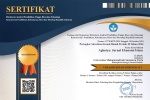Wakaf Sebagai Filantropi Ekonomi Islam Dalam Menciptakan Kesejahteraan: Perspektif Tafsir Tematik Terhadap QS. Ali Imran (3:92)
Abstract
References
Abdullah, M. (2020). Islamic endowment (Waqf) in India: Towards poverty reduction of Muslims in the country. Journal of Research in Emerging Markets, 2(2), 48–60. https://doi.org/10.30585/jrems.v2i2.482
Ahmad, U. S. (2022). Zakat, Infak, Sedekah, Wakaf dalam Filantropi Islam. Yasin, 2(5), 749–761. https://doi.org/10.58578/yasin.v2i5.1048
Al-Bashir, M. (2015). Fiqh al-Waqf al-Mu’āṣir (Jilid 1). Kairo: Dar al-Nawazil.
Al-Qaradawi, Y. (2003). Fiqh al-Zakat (Jilid 2). Beirut: Dar al-Qalam.
Al-Qurthubi, I. A. ’Abdullah M. ibn A. (2014). Al-Jami’ li Ahkam al-Qur’an (Jilid 7). Beirut: Dar Al-Kotob Al-Ilmiyah.
Ardiyansyah, R., & Kasdi, A. (2021). Strategies and Optimizing the Role of Productive Waqf in Economic Empowerment of the Ummah. Ziswaf: Jurnal Zakat Dan Wakaf, 8(1), 61. https://doi.org/10.21043/ziswaf.v8i1.9871
Asra, A., & Savitri, A. (2023). Optimization of Productive Waqf for Improving Community Economic Welfare. Jurnal Akuntansi Muhammadiyah, 13(2), 35–45. https://doi.org/10.37598/jam.v13i2.1895
Ayub, M. (2022). Promoting the Institution of Waqf for Socio-economic Development in Islamic Societies. Journal of Islamic Business and Management (JIBM), 12(02), 139–141. https://doi.org/10.26501/jibm/2022.1202-001
Camelia, Minhatus Sania, Dava Dhito Sasiaji, & Muhammad Taufiq Abadi. (2024). Peran Dana Sosial (Waqf) Dalam Mendorong Pertumbuhan Ekonomi Dan Pengentasan Kemiskinan Di Negara-Negara Muslim. Jurnal Ekonomi Bisnis Dan Manajemen, 2(1), 129–135. https://doi.org/10.59024/jise.v2i1.554
Dharmarianti, D. P., Hasanah, N., Irfany, M. I., & Haq, D. A. (2024). Waqf Management in Pesantren: A Case Study of Lembaga Wakaf Daarut Tauhiid. The Economic Review of Pesantren, 3(1). https://doi.org/10.58968/erp.v3i1.417
Efendi, M. I., & Herlinawati, E. (2022). Implementation of Islamic Economic Systems in Poverty Reduction (Case Study in Sorong City, West Papua, Indonesia). IQTISHODUNA: Jurnal Ekonomi Islam, 11(1), 97. https://doi.org/10.54471/iqtishoduna.v11i1.966
Farhany, H., & Nurkomalasari, N. (2022). Telaah Tafsir Surat Al-Imran Ayat 92 dalam Kajian Wakaf Uang Sebagai Instrumen Penguat Filantropi Ekonomi Islam. Jurnal Maps (Manajemen Perbankan Syariah), 6(1), 30–42. https://doi.org/10.32627/maps.v6i1.569
Hadiyanto, R., Irwansyah, S., & Firdaus Nuzula, Z. (2023). The Development Model of Islamic Philosophy to Realize the Independence of Islamic Boarding Schools. KnE Social Sciences. https://doi.org/10.18502/kss.v8i18.14347
Hafandi, A., & Helmy, M. (2021). Creating a Social Justice Trough Zakat and Its Relevant To Poverty Alleviation: a Perspective of Abul a’La Al-Maududi. An-Nisbah: Jurnal Ekonomi Syariah, 8(1), 1–31. https://doi.org/10.21274/an.v8i1.3622
Hasanah, U., Harisah, H., & Al Humaidy, M. A. (2024). Innovation in Distribution of Wealth Through Zakat: Building Shared Prosperity by Applying Tafsir Qs. At-Taubah Verse 60. Al-Hiwalah : Journal Syariah Economic Law, 3(1), 13–31. https://doi.org/10.47766/alhiwalah.v3i1.2568
Jamal, M., Hidayatulloh, A. F., & Ahmad, R. A. (2024). Taxes and Islamic Philanthropy: Unlocking the Potential of Waqf in Individual Tax Reductions. OIKONOMIKA : Jurnal Kajian Ekonomi Dan Keuangan Syariah, 5(1), 28–39. https://doi.org/10.53491/oikonomika.v5i1.706
Katsir, I. (2000). Tafsir al-Qur’an al-‘Azim (Jilid 2). Beirut: Dar al-Fikr.
Mahdiah, N., Hasanah, N., & Nursyamsiah, T. (2020). Factors Effecting Waqif’s Decision in Selecting Productive Waqf (Case Study at Dompet Dhuafa Republika). Al-Muzara’Ah, 7(2), 27–39. https://doi.org/10.29244/jam.7.2.27-39
Rufaida, A. M., Purnama Sari, Y. T., Agustina, R., & Utami, A. A. (2024). Philanthropic Practices and Zakat Distribution Mechanisms for Equal. International Conference on Islamic Economic (ICIE), 3(1), 160–170. https://doi.org/10.58223/icie.v3i1.345
Rusydiana, S., & Sherrindra, A. A. (2022). Development of Islamic Bank-based Cash Waqf Management in Indonesia. Islamic Social Finance, 2(2). https://doi.org/10.58968/isf.v2i2.135
Sahabi, A., & Ajuna, L. H. (2022). Transformasi Filantropi Islam Sebagai Model Pemberdayaan Zakat, Infak, Sedekah, Dan Wakaf (ZISWAF). Asy Syar’Iyyah: Jurnal Ilmu Syari’Ah Dan Perbankan Islam, 7(2), 233–252. https://doi.org/10.32923/asy.v7i2.2770
Saiti, B., Dembele, A., & Bulut, M. (2021). The global cash waqf: a tool against poverty in Muslim countries. Qualitative Research in Financial Markets, 13(3), 277–294. https://doi.org/10.1108/QRFM-05-2020-0085
Sholihah, F. D., Wahidatun Nafiah Al-Farda, & Lala Tri Wulandari. (2024). Study of the Role of Productive Waqf in Improving Community Welfare: A Qualitative Study at Rohmatul Ummah Islamic Boarding School Ringinrejo, Kediri, Indonesia. Open Access Indonesia Journal of Social Sciences, 7(4), 1649–1658. https://doi.org/10.37275/oaijss.v7i4.259
Syarifuddin, F. (2024). Productive WAQF business models through the integration of Islamic social and commercial finance. Edelweiss Applied Science and Technology, 8(4), 620–655. https://doi.org/10.55214/25768484.v8i4.1440
Yasniwati, Y. (2023). Wakaf Produktif dan Peranannya dalam Mengentaskan Kemiskinan di Indonesia. Nagari Law Review, 7(1), 192. https://doi.org/10.25077/nalrev.v.7.i.1.p.192-198.2023
DOI: https://doi.org/10.30596/aghniya.v7i1.23118
Refbacks
- There are currently no refbacks.
Aghniya: Jurnal Ekonomi Islam is licensed under a Creative Commons Attribution-ShareAlike 4.0 International License.
Aghniya: Jurnal Ekonomi Islam
Faculty of Islamic Religion,Universitas Muhammadiyah Sumatera Utara. Address: Kampus Utama Jl. Kapten Muchtar Basri No.3, Glugur Darat II,Medan Sumatera Utara-20238.
E-mail: aghniya@umsu.ac.id





